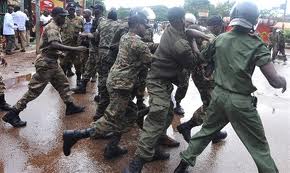War In DRCongo
Feb 26, 2020
Story

In addition to millions of deaths, the wars that ravaged the Democratic Republic of Congo (DRC) for a little over a decade has resulted in countless acts of sexual violence against women, crimes that continue even when the guns fall silent.
Since last Autumn, especially the province of North Kivu, where open war resumed, that commands attention. But other parts of Congo are not excluded by violence against women, and for several reasons. First there is the fact that veterans, once demobilized, "keep the same mentality." What mentality? That of fighting "a war that ends in women's bellies."
Add to that the impunity that persists despite the Congolese laws designed to punish the perpetrators of this crime, and you have a situation where the bad example spreads. "Increasingly, the rapists are civilians," according to surveys made in my association Cinefemme.
Although the war has exacerbated the problem. It is not for nothing that the Security Council of the United Nations adopted last year a resolution to clarify that sexual violence in conflict is a war crime.
However, we also put into question the cultural context. "According to custom, the woman is considered as an object. This is why it is possible to get into a house and raping women and girls, even before the husband. Formerly, it was customary for a man takes a wife, but the next day, his family and apologized discussing a dowry to pay. Now, we simply take the woman then left with the aftermath. "
We guess the kind of sequel of diseases such as HIV-AIDS, which is very high in the eastern DRC, rejection by family and community, children from rape, which often end up in the street .
Cinefemme is a non-profit organization whose mission is to work in synergy with women's groups to provide a window of visibility to their most relevant for the woman and child shares; this to produce a multiplier effect of advocacy and lobbying. Thus Cinefemme documents, audiovisual material on the relevant issues addressed by women's associations preferably the ignored or not sufficiently known to the local, national and international issues.




